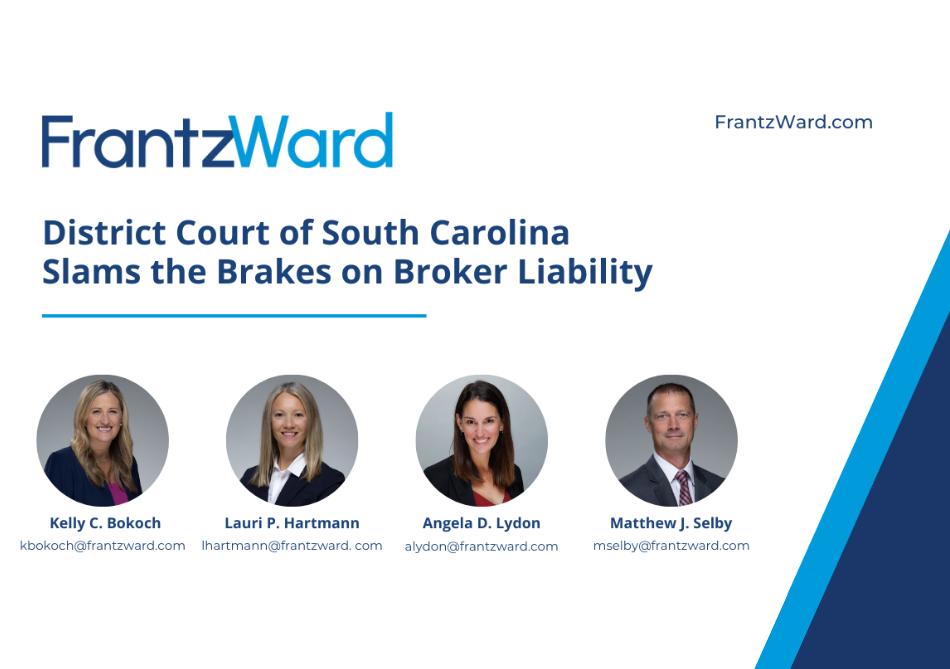District Court of South Carolina Slams the Brakes on Broker Liability
In a negligence action brought against transportation broker, Echo Global Logistics, Inc. (“Echo”), the District Court for the District of South Carolina held that Congress expressly preempted state laws related to brokers’ services under the Federal Aviation Administration Authorization Act (“FAAAA”). The court also held that the so-called safety exception to that preemption does not apply to brokers. See Fuelling v. S&J Logistics LLC, D.S.C. No. 7:22-cv-00905-JDA, 2024 U.S. Dist. LEXIS 207892 (Nov. 15, 2024).
Case Background
On January 3, 2022, Echo, a national freight broker, hired S&J Logistics to transport product from Georgia to Pennsylvania. During transport, while driving in a construction zone, the driver failed to slow and stop with traffic. As a result, the transportation vehicle collided with a pickup truck killing its passenger. Plaintiff, the decedent’s wife, sued Echo alleging vicarious liability for the driver’s negligence and negligent hiring and selection of the carrier.
The two main issues the court addressed were (1) whether the negligence claims fell within the preemption provision of the FAAAA (§ 14501(c)(1)) and (2) whether the claims could nevertheless be saved under the “safety exception” of § 14501(c)(2)(A).
§ 14501(c)(1) states in relevant part that a state:
may not enact or enforce a law, regulation, or other provision having the force and effect of law related to a price, route, or service of any motor carrier…or any motor private carrier, broker, or freight forwarder with respect to the transportation of property.
§ 14501(c)(2)(A), known as the “safety exception” is one of several exceptions to the general preemption above. In relevant parts, it states:
[§ 14501(c)(1)] shall not restrict the safety authority of a State with respect to motor vehicles, the authority of a State to impose highway route controls or limitations based on the size or weight of the motor vehicle or the hazardous nature of the cargo, or the authority of a State to regulate motor carriers with regard to minimum amounts of financial responsibility relating to insurance requirements and self-insurance authorization.
Emphasis added.
Case Outcome
The court granted Echo summary judgment based upon the language of the FAAAA. The court held that negligence claims fit in the broad language, “relating to,” in the general preemption provision. Further, that provision specifically names “brokers,” indicating the legislature’s intent that brokers be preempted from liability.
Next, the court found for the first time in the Fourth Circuit that the safety exception would not intervene to save the claim. In reaching this determination, the court looked at the alternative rule in the 9th U.S. Circuit Court of Appeals in Miller v. C.H. Robinson Worldwide, Inc., 976 F.3d 1016 (9th Cir.2020). In Miller, the court held that the safety exception does apply, and brokers can be liable in negligence claims involving motor vehicles because those claims are encompassed in “the safety regulatory authority of a state.” Id. at 1026, 1031. However, the Echo court declined to adopt that rule and conversely found that South Carolina’s safety regulatory authority does not extend to a broker’s hiring practices. The court held that brokers were expressly preempted from state law negligence claims, such as those that arose in this case. Fuelling at 13-14.
In so finding, the court reasoned that the language in the safety exception provision, “with respect to,” indicates that Congress intended a different scope because they did not use “relating to” as they used previously in the statute. Additionally, because that provision does not explicitly reference “brokers,” as are mentioned in the general provision, the court reasoned that brokers were not intended to be subject to the safety exception. The court stated that this narrow interpretation of the exception aligns with the Seventh and Eleventh Circuit’s interpretations, specifically construing the exception to “save only claims that have ‘a direct relationship to’ motor vehicles.” This provides brokers in the Fourth Circuit protection from negligence claims under the FAAAA.
Ultimately, while this holding may afford brokers some protection from liability in motor vehicle accidents, it also highlights the importance of ensuring carrier vetting protocols and well written broker agreements at the outset. Please contact our transportation team to assist with these complex considerations.


